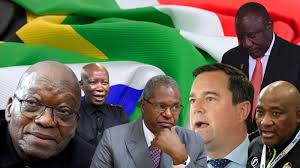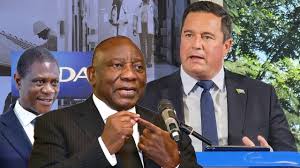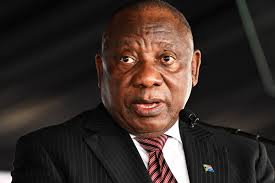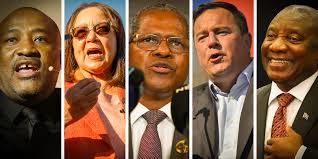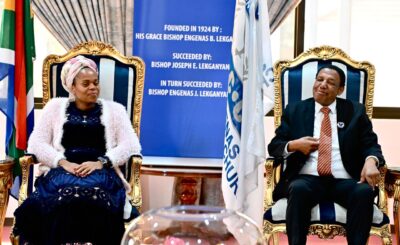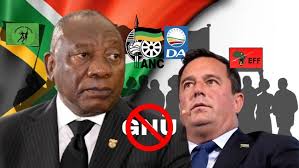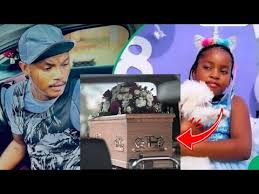More than 40% surveyed said they would back an ANC-DA coalition, possibly including other members of the Multi-Party Charter such as the IFP and FF+.
Only 19.5% supported an ANC-MK Party coalition, while far fewer — 9.5% — supported an ANC-EFF coalition. Just under 6% favoured an ANC minority government.
But President Cyril Ramaphosa has for the moment dodged choosing a coalition partner by proposing a “government of national unity” (GNU) which conceivably could include parties that have diametrically opposed views on all major policy issues.
Ramaphosa said he was making the proposal because, “We are at a moment of fundamental consequence. We must act with speed to safeguard national unity, peace, stability, inclusive economic growth, non-racialism and non-sexism. We will invite political parties to form a government of national unity.”
He mentioned “constructive discussions” with the EFF, IFP, DA, NFP and PA.
What he did not mention is that some of these parties hold radically different views on the Constitution, the rule of law and sound fiscal management.
The reality is that, despite the President’s predilection to kick the can down the road, the ANC faces a stark choice: Reinforce the pro-Constitution centre that wants to see sound economic management and inclusive growth or pivot to the populist left that wants the constitutional order upended and the introduction of radical economic policies.
It requires Ramaphosa to make a serious and defining choice, something which he has avoided doing so far, with disastrous effect, during his presidency. As he selects membership of a GNU, now is his moment to place himself on the right side of history, on that which aligns with the document — the Constitution — for which he was partly responsible.
This moment is not about appointing committees, task teams or working groups, it is not even about “consulting broadly” within the party where all manner of interests, including the preservation of 30 years of rents, are simmering.
For the country, the choice — and the outcome — is fundamental. It will determine South Africa’s trajectory for years to come, affecting the strength of independent institutions and thereby the rule of law and investment.
President Cyril Ramaphosa has decided to form a national unity government to rule the country for the next five years.
This is a broad coalition government consisting of all parties in the legislature.
“We have already spoken to EFF, IFP, DA, PA, NFP and PA. The NEC has agreed to seek further engagements on the government of national unity,” says Ramaphosa.
South Africa’s African National Congress will invite other political parties to form a national unity government, its leader President Cyril Ramaphosa said on Thursday, after it lost its majority for the first time in the democratic era.
The former liberation movement once led by Nelson Mandela has run South Africa since it swept to power in a 1994 election that marked the end of white minority rule. But it was punished for its chequered record in last week’s vote.
After a day-long meeting of the party’s National Executive Committee in Johannesburg, Ramaphosa said the ANC had decided that a broad collaboration with other political forces was “the best option to move our country forward.”
“Political parties should come together to forge a common future for our country,” he told a news briefing. “We must act with speed to safeguard national unity, peace, stability, inclusive economic growth, non-racialism and non-sexism.
Despite its worst ever showing in the May 29 vote, the ANC remains the country’s largest party and will control 159 of the 400 seats in the new National Assembly.
The election outcome has created a complex situation for Ramaphosa and his party.
“We will not preclude the possibility of working with any party so long as it is in the public interest,” Ramaphosa said.
He added that the ANC had already held constructive discussions with the EFF, DA, the smaller Inkatha Freedom Party, National Freedom Party and Patriotic Alliance.
MK confirmed in a statement on Thursday that it had been in contact with the ANC and a meeting was expected soon.
Africa’s most developed economy has been in decline for the past decade, with sluggish growth, high levels of poverty and unemployment, crumbling infrastructure and political corruption.
“The purpose of a government of national unity must be first and foremost to tackle the pressing issues that South Africans want to be addressed,” Ramaphosa said.
The new parliament has to convene within two weeks of Sunday’s results declaration and one of its first acts must be to elect the president.
The constitutional deadline, which will fall on or near June 16, is putting pressure on the ANC and others to reach an agreement quickly.
ANC’S DIFFICULT SEARCH FOR PARTNERS
The DA, for its part, signalled on Wednesday it did not want to join a government that also included MK or the EFF.
Any deal with the DA would be welcomed by financial markets but unpopular with many ANC supporters who regard it as the party of South Africa’s wealthy white minority.
A group of anti-DA protesters stood outside the hotel where the NEC meeting was taking place, holding placards reading “The DA wants to destroy the ANC” and “Not in our names”.
On the other hand, a deal with the EFF or MK, which advocate nationalising mines and seizing land without compensation, would be more popular with some in the ANC base but risks tanking the economy, analysts say.
Both the EFF and MK are led by former ANC figures who are at odds with the current leadership. Zuma in particular openly loathes Ramaphosa, and his party said after the election that it would not work with “the ANC of Ramaphosa”.
The ANC said on Wednesday it would not talk to anyone who demanded Ramaphosa’s resignation as a condition of joining an alliance.
Zuma was forced to quit as president in 2018 after a series of corruption scandals. He was jailed for contempt of court after refusing to participate in an inquiry into corruption, a decision that barred him for running for parliament.
He remains well-liked in his home province, populous KwaZulu-Natal, where extra police have been deployed this week to maintain public order.
The province was the scene of deadly riots in 2021 when Zuma was sentenced.
